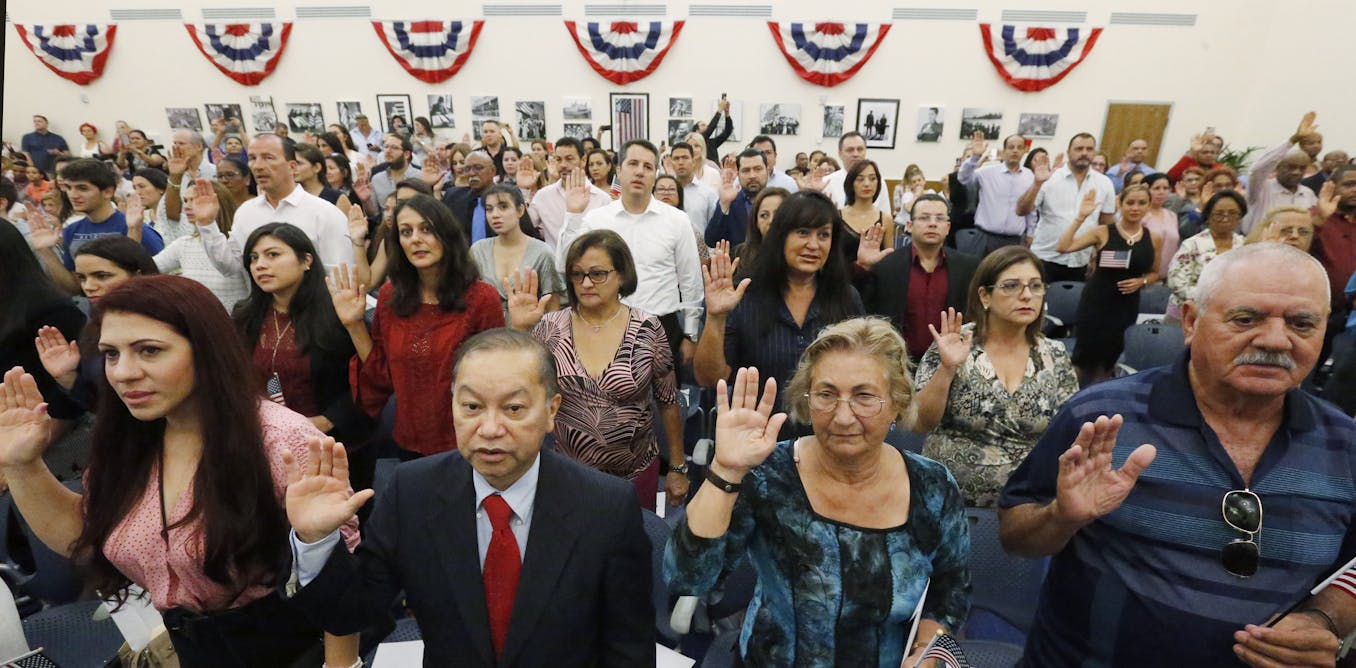Experts, politicians and concerned Texans say their state could be a blueprint for Republican efforts to stave off losses in next year’s elections, with some calling the GOP division a “festering wound” in Texas – all while Donald Trump stacks the deck against potential Democratic inroads.
Last month, nearly 150 people showed up at a Tarrant county commissioners court meeting in north Texas. The packed building wasn’t used to such a high volume of visitors, but the day’s key vote had been hotly contested for weeks.
In an unusual move, the commissioners court initiated a redistricting process that both liberal and conservative voters widely criticized. One map, as proposed, would essentially funnel more people of color away from precinct 2 and into precinct 1, thereby creating an opening for a GOP that has historically underperformed with people of color. The map’s staunchest critics called the map “racial gerrymandering”, while the county judge, Tim O’Hare, claimed it was just about politics.
“It’s purely partisan,” he told a local TV station in the days before the vote. “At the end of the day, I’m doing it to put another Republican on the commissioners court, period, the end.”
At the 3 June meeting, dozens of speakers rose to voice their concerns, and several were kicked out of the meeting by O’Hare.
“Your constituents are telling you that they do not want these maps,” one woman said during the public comment section. She was then removed from the building.
The controversial map was approved by a 3-2 vote. Shortly afterward, the Trump administration said it wanted more maps to be redrawn in Texas ahead of the 2026 midterms – and a special legislative session called for later this month could pick up that cause.
Amid a heated Senate primary race and Trump’s slipping approval rating, Brandon Rottinghaus, a political scientist at the University of Houston who has extensively researched the Texas GOP, said “partisan leaders are always looking for an edge”.
“Redistricting gives them the clearest opportunity to increase their strength and numbers. Tarrant county is the last big urban purple county and Republicans definitely want to plant their flag deeply there,” he continued.
Bob Stein, a gerrymandering expert at Rice University in Houston, echoed Rottinghaus’s comments.
“Republicans are afraid they’re going to lose upwards of three to four seats in Louisiana, California and New York and probably New Jersey,” he said. “In fact, some of the privileged stuff I get to see says it could be a complete sweep. So what they want to do is get going now, and what you’re seeing in Tarrant county is the effect of that.”
Multiple experts and politicians interviewed for this story pointed out how Texas isn’t as conservative as one might think. Rather, Texans just don’t vote enough.
A little over 60% of eligible Texas voters cast ballots in the 2024 election, which was six percentage points lower than the total in 2020. Most recently, less than 8% of Tarrant county voters cast ballots in May’s local elections.
Beto O’Rourke, a Democrat, received more votes in Tarrant county in 2018 than the Republican senator Ted Cruz, and both Joe Biden and recent Cruz challenger Colin Allred also won Tarrant county in their respective races.
All of this spells trouble for the GOP as it prepares for 2026, especially in light of a GOP primary race that has already gotten personal.
Senator John Cornyn, who has been in office since 2002, is being challenged by the state attorney general, Ken Paxton, whose controversies includes an attempt to overturn the 2020 presidential election and an impeachment on charges of bribery, obstruction of justice, harassment and abuse of office.
Cornyn, who is typically seen as a more traditional Republican, has attacked Paxton’s character, using terms such as “conman” and “fraud” to describe his opponent. Paxton, for his part, has cast Cornyn as an establishment figure out of touch with Texas.
“The split in the Republican party will definitely be on full display in this election,” Rottinghaus said. “The establishment Republicans are very worried about losing the seat. You can see that in all the polling. You can see that in their attitudes and actions in how they’re giving money and which staff are supporting which candidate. I mean, this is a wound that’s been festering for a long time. It has not been sutured closed, and it may never be.”
The worry from the GOP, Rottinghaus added, is that a Paxton primary win could pave the way for a Democrat to mount a successful challenge in 2026.
Ken Shimamoto, a Fort Worth resident who opposed his county’s recent redistricting, is following the Cornyn-Paxton primary race and displeased by what he sees. But he was not surprised.
“Everybody hates Ted Cruz, but Cornyn seemed the more reasonable senator until Paxton mounted his challenge,” he said. “And ever since then, it seems like Cornyn has been bending over backwards to appease Donald Trump.”
Some of Cornyn’s bending has been overt, such as posting a photo of himself reading Trump’s book The Art of the Deal with a one-word caption: “Recommended.”
Other efforts have been less obvious but far more insidious.
Three days after Paxton announced his challenge, Cornyn asked the Department of Justice to investigate the East Plano Islamic Center’s plans to build a community around a mosque. Without evidence, the senator claimed such a project could constitute religious discrimination.
Despite widespread criticism (the Council on American-Islamic Relations called Cornyn’s complaint “factually baseless”) the justice department opened an investigation – only to close it roughly a month later.
To Texans like Shimamoto, as well as the political scientists interviewed for this story, there’s a clear tie between gerrymandering and races like the Cornyn-Paxton fight. Only the most extreme candidates win in a primary, which means conservatives must run further right if they hope to triumph or keep the seat they already have.
“We’ve been gerrymandered to death,” said Allison Campolo, who lives in Fort Worth and is running to be chair of the Tarrant county Democratic party. “That really drives down engagement, it prevents people from knowing what their elected representatives are doing and how it affects them.”
At the same time, politicians like Cornyn, Paxton and even Trump are unpopular in Texas. Recent polls show a majority of Texans disapprove of Trump, while only 29% of the state’s residents currently approve of Paxton’s performance. For Cornyn, that number is 24%.
Theoretically, this is good news for people upset about redistricting efforts or unhappy with their current leadership – but only if they vote.
“Texans have to continue to vote and make their voices heard,” said Democratic House representative Marc Veasey, whose district includes part of Fort Worth.
On redistricting, Veasey said that it was already being challenged in court on the basis that it violates both the constitution and the Voting Rights Act. To defend against the lawsuit, the commissioners court once again voted 3-2 to hire a law firm called the Public Interest Legal Foundation – the same firm that led the redistricting process.
As disheartening as this may be, Veasey urged Texans to “not give up”. “Texans can continue to tune in, not out. Continue to fight, vote, and make your voices heard.”

 German (DE)
German (DE)  English (US)
English (US)  Spanish (ES)
Spanish (ES)  French (FR)
French (FR)  Hindi (IN)
Hindi (IN)  Italian (IT)
Italian (IT)  Russian (RU)
Russian (RU)  8 hours ago
8 hours ago
























Comments